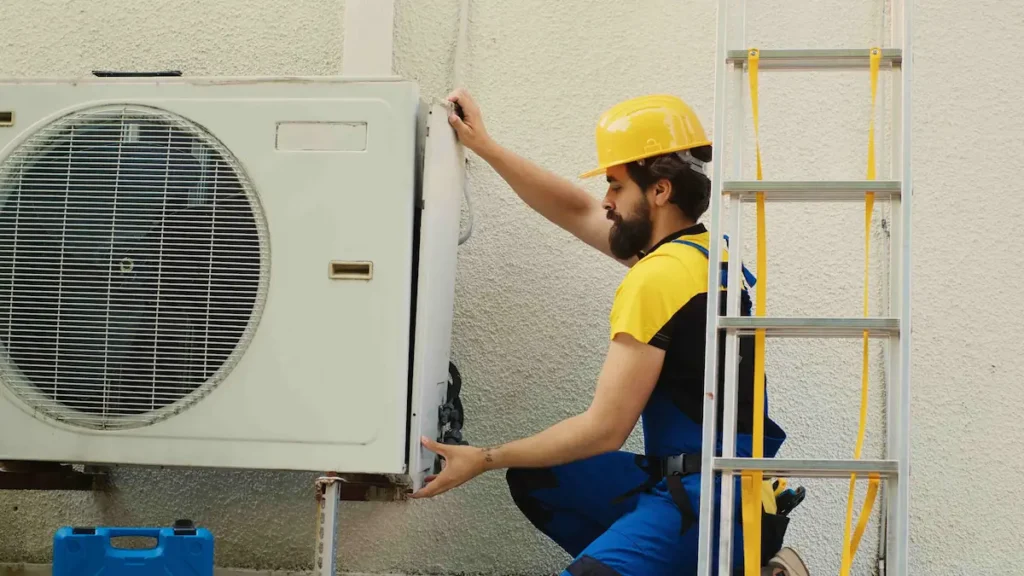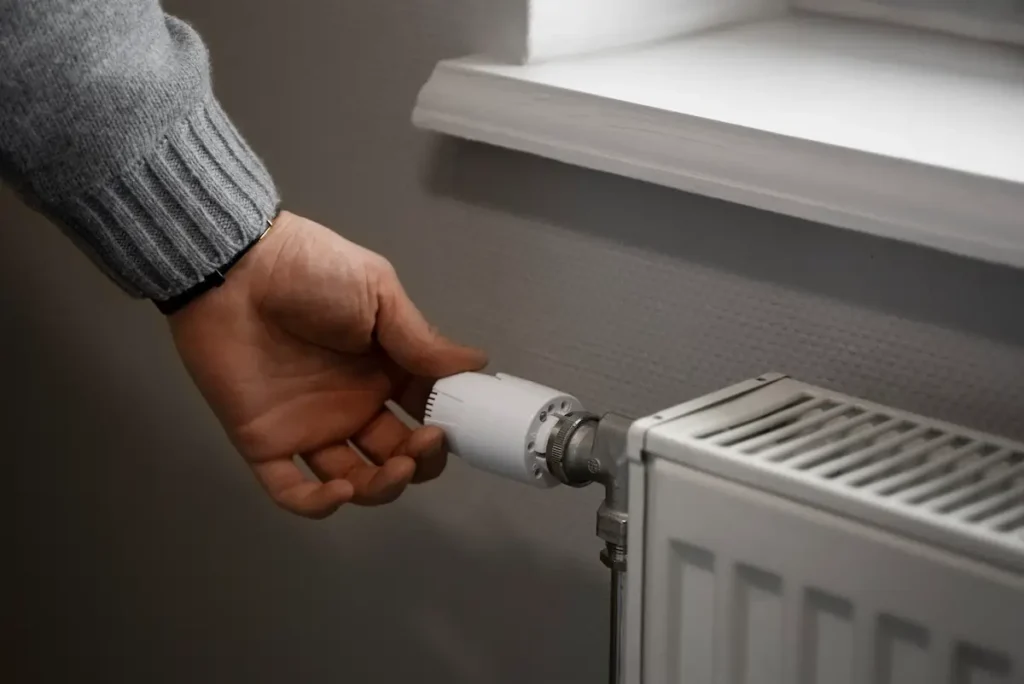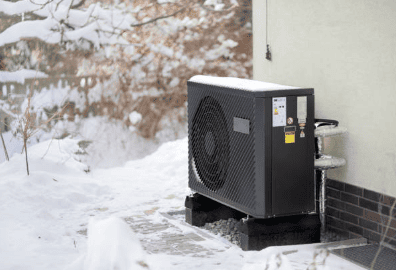People often ask not only if heat pumps work, but if they’re actually worth it — financially and environmentally. With rising energy bills and growing climate concerns, this question matters more than ever for UK homeowners.
The good news? When you look at the full picture—including government support, long-term savings, and environmental benefits—heat pumps represent a genuinely worthwhile investment for most British households.
Let’s break down exactly why.

How Much Do They Cost?
Installation Costs
The upfront cost for installing an air source heat pump in a typical 3-4 bedroom UK home ranges from £7,000 to £15,000, with most installations falling between £9,000 and £14,000. Ground source heat pumps are considerably more expensive, with average installation costs of nearly £24,000 according to government statistics, though these systems offer slightly better efficiency and performance.
The price variation depends on several factors: the size of your property, your heating requirements, the complexity of installation, and whether you need additional work such as upgraded radiators or improved insulation. Air-to-water heat pumps, which provide both heating and hot water, sit at the higher end of the price range compared to air-to-air systems that offer heating and cooling.
It’s important to note that these figures represent the total project cost before any government grants. The actual amount you’ll pay out of pocket is significantly lower, as we’ll discuss in the government grants section below.
Running Costs
A typical UK home can expect to spend approximately £855 to £1,700 annually on heating and hot water with an air source heat pump, depending on usage patterns and home size. This compares to roughly £800-£1,200 per year for a gas boiler under current energy prices.
At first glance, these running costs might appear similar or even slightly higher than gas heating. However, this doesn’t tell the whole story. Heat pumps operate at 300-400% efficiency (producing 3-4 units of heat for every unit of electricity consumed), whilst even the best gas boilers max out at around 90% efficiency. The running costs between air source heat pumps and gas boilers appear quite similar based on current energy prices, with gas boilers slightly cheaper to run annually, but several important factors can shift the balance significantly in favour of heat pumps.
Homes with good insulation see much better performance and lower running costs with heat pumps. Additionally, if you’re replacing oil, LPG, or electric heating rather than mains gas, heat pumps almost always deliver substantially lower running costs. Annual servicing for heat pumps typically costs between £150 and £300, which is comparable to or slightly lower than gas boiler servicing requirements.
How Much Can You Save?
The savings you’ll achieve with a heat pump depend heavily on what type of heating system you’re replacing and how efficiently you use your new system. Here’s a realistic breakdown of potential annual savings:
| Current Heating System | Estimated Annual Savings (UK) | 20-Year Lifetime Savings |
|---|---|---|
| Gas Boiler | £150 – £200 | £3,000 – £4,000 |
| Oil Boiler | £200 – £600 | £4,000 – £12,000 |
| LPG* | £400 – £800 | £8,000 – £16,000 |
| Electric Storage Heaters | £800 – £1,300 | £16,000 – £26,000 |
*LPG : Liquefied Petroleum Gas
Replacing a gas boiler with an air source heat pump can save approximately £290 to £380 annually on energy bills. Whilst this might seem modest at first, remember that these savings compound over the 15-20 year lifespan of your heat pump. Over two decades, even conservative savings translate to thousands of pounds.
The savings are dramatically higher if you’re replacing older, less efficient heating systems. Homes currently using oil, LPG, or electric heating often see their energy bills cut by 40-60% after switching to a heat pump. This is because these fuel sources are significantly more expensive per unit of heat delivered than the electricity used by an efficient heat pump.
Beyond direct energy savings, heat pumps can increase your property’s Energy Performance Certificate (EPC) rating. Higher EPC ratings not only make your home more attractive to potential buyers but may also increase its market value. With the government planning to implement stricter energy efficiency requirements for rental properties and potential future regulations for owner-occupied homes, improving your EPC rating now offers protection against future compliance costs.
It’s also worth noting that as the UK’s electricity grid continues to incorporate more renewable energy sources, the cost advantage of heat pumps is expected to grow. Conversely, carbon taxes and environmental levies on fossil fuels are likely to increase, making gas and oil heating progressively more expensive over time.
Government Grants & Financial Help
One of the most significant factors making heat pumps worth it in 2025 is the generous government support available through the Boiler Upgrade Scheme (BUS).
The Boiler Upgrade Scheme
The scheme offers grants of £7,500 for both air source heat pumps and ground source heat pumps, with grants of £5,000 available for biomass boilers. This substantial support is deducted directly from your installation quote—you don’t need to pay upfront and claim back later. With the government grant applied, a typical heat pump installation costs around £4,460, which is comparable to or even cheaper than a premium gas boiler installation.
After applying the £7,500 grant, the average ground source heat pump installation cost reduces from nearly £24,000 to around £16,500. This makes even these more expensive systems considerably more accessible to UK homeowners.
Eligibility Requirements
Homeowners, private landlords, and second-home owners are eligible for the scheme. However, there are some important criteria to meet:
- New-build homes and social housing are not eligible, although self-build properties can qualify
- You must have a valid Energy Performance Certificate (EPC) for your property
- You must be replacing a fossil-fuel-based heating system with an approved low-carbon solution
- Your installer must be MCS (Microgeneration Certification Scheme) certified
The application process is handled by your installer, who will submit all necessary paperwork on your behalf. Applications must be submitted within three months of the heat pump being commissioned, so it’s crucial to work with an organized and efficient installer who understands the scheme requirements.
Additional Financial Support
Beyond the Boiler Upgrade Scheme, some energy suppliers offer interest-free payment plans to spread the cost of installation. Local authorities may also provide additional grants or support programmes, particularly for low-income households or properties in specific areas. It’s worth checking with your local council to see what additional support might be available in your region.
Long-Term Value: Why Heat Pumps Make Sense

Minimal Maintenance Requirements
Heat pumps are remarkably low-maintenance compared to traditional heating systems. Unlike gas boilers, which burn fuel and have components that degrade through combustion, heat pumps simply move heat from one place to another using electricity. This fundamental difference means fewer moving parts, less wear and tear, and greater reliability over time.
Annual servicing typically costs between £150 and £300, and many providers offer service plans that work out slightly cheaper. These annual checks ensure your system continues to operate efficiently, but heat pumps generally don’t require the same level of intensive maintenance as gas boilers. There’s no need for annual gas safety inspections, no concerns about carbon monoxide leaks, and fewer components that can fail unexpectedly.
The typical lifespan of a well-maintained heat pump is 15-20 years, comparable to or exceeding that of conventional heating systems. Some ground source heat pumps can last even longer, with the ground loop itself potentially lasting 50+ years.
Protection Against Rising Energy Prices
Energy prices have proven volatile in recent years, and there’s no indication they’ll return to pre-2022 levels anytime soon. Heat pumps offer a degree of protection against this volatility. Because they’re 3-4 times more efficient than direct electric heating, even if electricity prices rise, the impact on your heating bills is proportionally smaller than for homes using electric storage heaters or direct electric heating.
Furthermore, the UK government has signalled its intention to rebalance energy prices to make electricity comparatively cheaper relative to gas. This policy shift aims to support the transition to electric heating and electric vehicles. As this rebalancing occurs, heat pumps will become increasingly economical compared to gas heating.
For homes that can pair a heat pump with solar panels, the economics become even more compelling. Solar electricity can power your heat pump during daylight hours, dramatically reducing running costs. Some homeowners with solar panels report cutting their heat pump operating costs by 40-60% during the warmer months.
Environmental Benefits and Future-Proofing
The environmental case for heat pumps is clear and compelling. Installing a heat pump can help reduce your carbon footprint significantly, boost energy efficiency, and help you save on energy bills. Unlike gas boilers, which will always produce carbon emissions at the point of use, heat pumps become cleaner over time as the UK’s electricity grid incorporates more renewable energy.
The UK government has set ambitious targets for decarbonising home heating as part of its commitment to reach net-zero emissions by 2050. Heat pump installation rates grew by an impressive 43% in 2024, with almost 60,000 certified heat pump installations, demonstrating rapidly growing adoption across the country.
Looking ahead, regulations around fossil fuel heating are likely to tighten. The government has already announced plans to phase out new gas boiler installations in the coming years. By installing a heat pump now, you’re not just making an environmentally responsible choice—you’re also future-proofing your home against upcoming regulatory changes. You’ll avoid potential future costs associated with mandatory upgrades whilst taking advantage of current grant schemes that may not be available indefinitely.
Heat pumps also eliminate indoor air quality concerns associated with combustion heating systems. There’s no risk of carbon monoxide poisoning, no combustion by-products affecting air quality, and no need for flues or chimneys. For families with children, elderly relatives, or members with respiratory conditions, this can represent a significant health benefit.
Increased Property Value
As energy efficiency becomes increasingly important to homebuyers, properties with modern, low-carbon heating systems are becoming more desirable. A heat pump installation typically improves your property’s EPC rating, which directly influences both marketability and value. Properties with better EPC ratings sell faster and often command higher prices than comparable homes with lower ratings.
With the government considering minimum EPC requirements for property sales in the future, investing in a heat pump now protects against potential future costs whilst making your property more attractive to environmentally conscious buyers.
Still Wondering If Heat Pumps Are Worth It?
The evidence is clear: for most UK homeowners, heat pumps represent an excellent investment. Between substantial government grants that bring installation costs down to competitive levels, long-term energy savings, minimal maintenance requirements, and significant environmental benefits, heat pumps deliver value that extends far beyond simple heating.
Yes, they require a different approach to home heating than traditional gas boilers. Yes, your home may need adequate insulation to get the best performance. And yes, the technology is still relatively new to many British homeowners. But with installation rates growing by over 40% annually and tens of thousands of satisfied customers already enjoying the benefits, heat pumps have proven themselves as a reliable, efficient, and cost-effective heating solution for the UK climate.
The real question isn’t whether heat pumps are worth it—it’s whether you can afford to miss out on the current government grants and continue paying unnecessarily high energy bills with outdated heating technology.
Ready to make the switch? Get a free audit or estimate today. Our expert team will assess your home’s suitability, calculate your potential savings, help you navigate the Boiler Upgrade Scheme, and provide a comprehensive, no-obligation quote. Don’t wait—take the first step towards lower energy bills, a warmer home, and a cleaner future. Contact us now to schedule your free consultation.
Or you can also contact us.
Now that you know heat pumps are worth the investment, you might be wondering about their performance during those cold British months. Read our complete guide on how heat pumps perform in winter to put any concerns to rest.
Sources :
- Greenmatch. (2025). “Air Source Heat Pump Costs in the UK: 2025 Guide.”
- The Eco Experts. (2025). “Heat Pump Costs 2025: Factors, Calculator & Running Costs.”
- TLC Renewables. (2025). “How Much Does a Heat Pump Cost in the UK? Full 2025 Guide.”
- Octopus Energy. “How much does a heat pump cost in 2025?”
- HomeOwners Alliance. (2025). “How Much Does A Heat Pump Cost 2025.”
- Heat Pumps UK. (2025). “Heat Pump v Gas Boiler: The Ultimate Comparison.”
